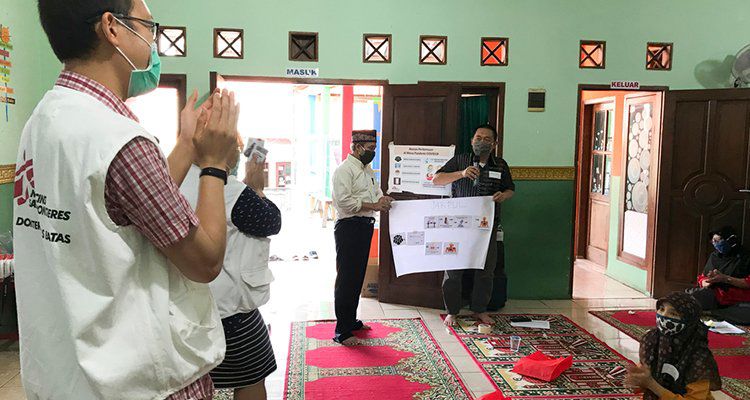In June, panic began to spread through Indonesian communities as COVID-19 cases started to be reported by health authorities. Rumours, myths and fake news proliferated. Community leaders and officials were bombarded by questions from community members pleading for clear facts about COVID-19.
“We received a lot of information,” says Muchtar Lufti, head of the Rukun Warga 5 (RW5) community unit, a sub-division of Kalibata village in South Jakarta. “Some of it was accurate, some could be defined as fake news. It was very difficult to filter and people were so confused.”
There was too much information coming from too many sources – social media, chat groups, and news reports on TV, radio and in print. The situation intensified when Kalibata village, in Pancoran sub-district, was declared a COVID-19 red zone.
“At that time, people were angry and protesting. They wanted to know why they were being told to stay at home. I did not know how to answer other than to say that the government had asked us to,” says Halimah, a member of the community’s COVID-19 taskforce.
Education, training and empowerment with MSF
An MSF team assessed the situation in Kalibata village. The team discovered that confusion and fear were widespread in South Jakarta and that it was difficult for most people to find trusted COVID-19 information sources.
“We discovered that the local health centres, or puskesmas, were eager for our support,” says Dr Dirna Mayasari, the MSF deputy medical coordinator in Indonesia. “We needed to help them find a way to educate and inform the community quickly and on a large scale. Fear can be just as harmful as COVID-19.”
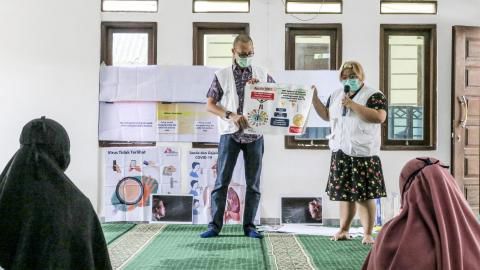
The MSF medical team introduced MSF to the participants. This training was attended by the adolescents of the village. © Sania Elizabeth/MSF
The puskesmas invited community leaders, religious leaders and those trained to train others to voice their concerns in a meeting with MSF.
“The community needed clear advice on how to protect themselves against COVID-19. But they also wanted to talk. All the information they were getting was just one-way communication,” says Mayasari. “The people wanted an opportunity to ask questions, discuss their worries and clarify the best methods to guard against this new virus. They also wanted to share ways to spread information within their communities.” Therefore, MSF decided to bring information closer and started conducting face-to-face trainings for the heads of the households that make up the RW5 community unit.
MSF started by training representatives from 10 households in RW5. The training sessions were attended by 10 people and lasted for two hours. They then expanded the exercise to cover the rest of the neighbourhoods in the area. From June to July, MSF reached over 150 people.
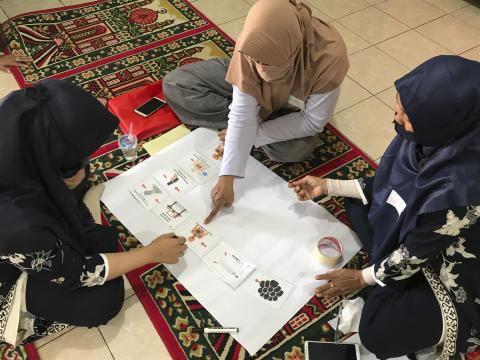
During the COVID-19 training for the community, the participants were divided into small groups. Each group was asked to rearrange the flash cards showing the virus’ journey until it infects a person. © Cici Riesmasari/MSF
“We believe that community empowerment is key in the response to this pandemic. If the people in our communities stay healthy, they do not need to go to the health facilities," said Mayasari.
The sessions were interactive – encouraging discussions, using visuals and role-playing. “It was a safe learning space,” says Halimah. “It was fun learning with flash cards, and with doctors and other medical staff delivering the information in a simple way. Now, we understand how the virus spreads, what to do if there is a COVID-19 positive case, and the steps we each can take to protect ourselves. Now that people are starting to go out due to the relaxed movement restrictions, we see that most of them are wearing masks, and they try to keep their distance from one another.”
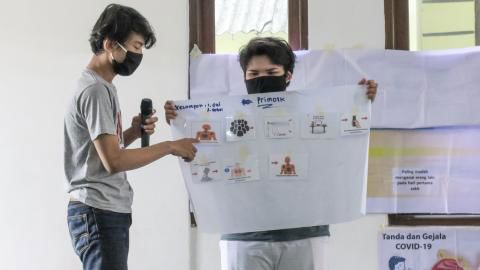
After they discussed it in their group, the adolescents in Kalibata Village, South Jakarta, Indonesia, presented their discussion results to the rest of the participants. © Sania Elizabeth/MSF
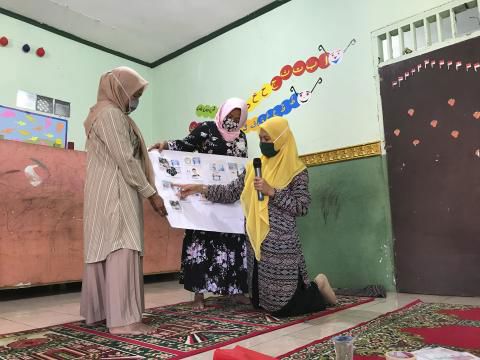
After they discussed it in their group, the female cadres, homemakers, and community or religious leaders, in Kalibata Village, South Jakarta, Indonesia, presented their discussion results to the rest of the participants. © Cici Riesmasari/MSF
Tackling the stigma of COVID-19
MSF’s health education sessions emphasised that stigmatising people infected with COVID-19 made the situation worse, as for example it led to people refusing to take the free COVID-19 tests provided by the puskesmas.
However, since the MSF-supported training and information sharing sessions began, community leaders are seeing less stigma in their neighbourhood of those who are sick with the virus. Halimah has also noticed the difference, “I could feel that there was a change in behaviour in our community. With our new knowledge of COVID-19, people feared the disease less, they complied with the safety measures, and they no longer stigmatised those who fell sick.”
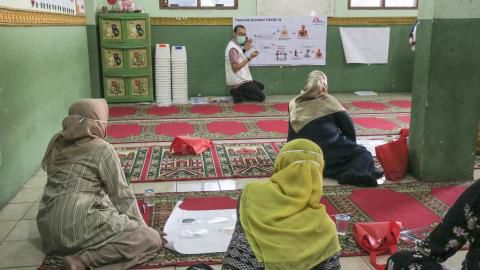
Dr Yulianto Santoso Kurniawan (front) and Nurse Lintang Tanjung Sibarani facilitated the MSF COVID-19 training for female cadres, homemakers, and community or religious leaders in Kalibata Village, South Jakarta, Indonesia. © Cici Riesmasari/MSF
After several MSF training sessions, an official from the puskesmas informed MSF that the number of people getting tested was increasing.
Today, MSF teams are conducting workshops and training for community health workers involved in the management of suspected COVID-19 cases and those observing home-isolation in Jakarta and in Banten province.
MSF activities in Indonesia started in 1995, after the Mount Kerinci earthquake in Jambi. MSF then provided medical treatment in various provinces of Indonesia until 2009 when it left the country. In 2017, MSF returned and today the MSF programmes in Indonesia include increasing people’s access to medical services in basic health facilities, training health workers, counselling services and providing health education to communities.


